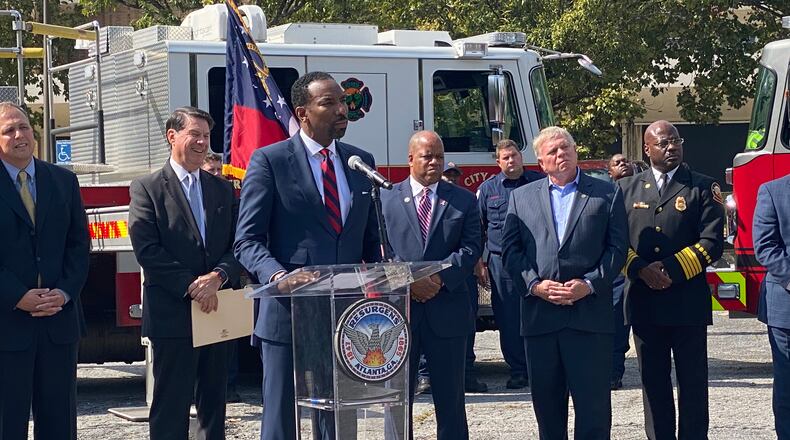Atlanta Mayor Andre Dickens and fellow mayors representing 15 cities in Fulton County remain at odds with county officials over how to divide local option sales tax revenue.
Dickens, leading a press conference outside the Atlanta Civic Center on Monday, said he believes Fulton has been insincere in mediation negotiations on the county allotment of LOST revenue to their respective cities.
The Atlanta mayor and mayors of north and south Fulton are fighting against a county proposal to decrease LOST revenue sent to them.
The mayors say a dramatic decrease would impact local services and raise property taxes. The cities collectively hired a public relations firm and created the website savefultoncities.com to get their message out to residents.
“They need to act in good faith,” Dickens said. “We need to make sure we have this LOST revenue fairly distributed which means the cities can then have enough money to provide for fire, and police and parks and the various things that we have to take care of.”
Fulton officials have been less vocal in public comments about the dispute, but in a statement late Monday the county said that Grady Health System and other agencies could weigh-in on how an increase in the county’s share of LOST revenue would help their organizations.
“Fulton County has received requests for more than $140 million annually for indigent health care,” Fulton spokeswoman Jessica Corbitt-Dominguez said in the statement.
The LOST is a one-penny sales tax that local governments use to pay for services. The tax is renegotiated every 10 years. Currently, Fulton cities’ collectively share 95% of LOST revenue, leaving the county less than 5%.
The cities and Fulton County commissioners have met twice in mediation to discuss changing distribution of the revenue, but did not come to an agreement. Both sides say they want to resolve the issue before the Dec. 31 deadline when the current LOST agreement lapses.
Dickens said that Fulton wanted a 163% increase in the county’s share of LOST revenue during the last mediation on Oct. 7.
“They just want additional revenue and that would then hurt the cities’ ability to do what we’re doing,” the mayor said. “They are hoping we will raise property taxes or reduce services — none of those are good options.”
Corbitt-Dominguez said the increase offered by the county would be phased in over the next decade.
“The county’s most recent offer would yield $22.8 million in LOST funding for the county in 2023 compared to $15 million in 2021, an increase of $7 million,” Corbitt-Dominguez said in the statement.
The spokeswoman said that in comparison, the cities’ last offer would give the county an increase of $1.2 million.
Credit: Adrianne Murchison
Credit: Adrianne Murchison
Commissioners say the county needs more funds to address greater mental health needs of residents, public health demands due to the stress on the Grady Hospital System and the closure of two hospitals, as well as the increased the jail population.
Johns Creek Mayor John Bradberry is asking residents to contact their Fulton commissioner with concerns about changes in the tax revenue for their cities.
“None of these cities and none of these mayors has any desire to be vindictive,” Bradberry said. “The cities represent more than 99% of residents of Fulton county.”
About the Author
Keep Reading
The Latest
Featured




